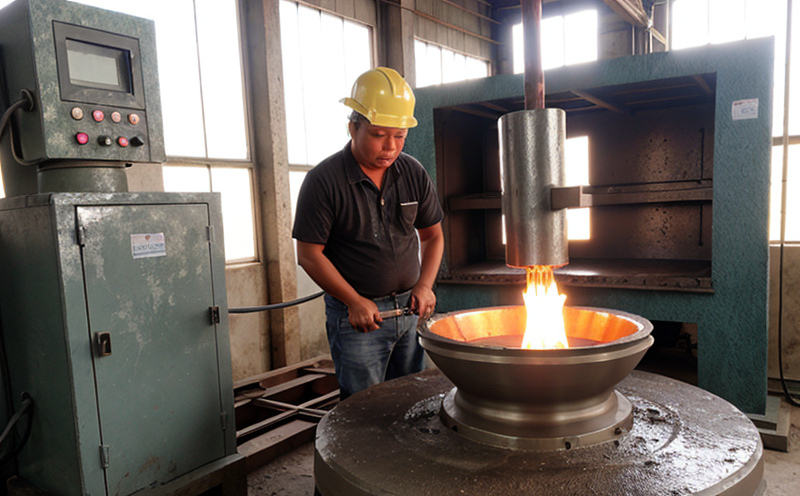ISO 8075 Resin Bonded Sand Testing
The ISO 8075 standard is a fundamental document for quality assurance in the casting and foundry industries. This standard specifies the test methods for determining the properties of resin-bonded sand used in molding processes. The testing ensures that the sands meet specific performance criteria, which are critical for producing high-quality castings.
Resin-bonded sand is widely used due to its excellent mechanical strength and thermal stability. These properties make it ideal for intricate mold-making processes where precision and durability are paramount. The standard covers various tests such as shear strength, permeability, and compressive strength, which are essential in ensuring the reliability of the casting process.
The testing procedure outlined in ISO 8075 involves preparing specimens according to the specified dimensions and then subjecting them to a series of mechanical tests. The results provide insights into the material's performance under different conditions, helping manufacturers optimize their processes. Compliance with these standards is crucial for maintaining product quality and ensuring that the end products meet customer specifications.
Understanding the key parameters involved in ISO 8075 testing can enhance one’s ability to interpret test results accurately. Shear strength measures a sand's resistance to shear forces, which is critical during mold filling and solidification processes. Permeability assesses how easily gases or liquids can pass through the sand, influencing the casting's quality by affecting porosity levels. Compressive strength evaluates the sand's capacity to withstand compressive loads.
The testing process typically begins with specimen preparation. Sand samples are mixed according to the specified ratios and then molded into standardized shapes. Once prepared, these specimens undergo a series of tests using specialized equipment designed for each parameter. For example, shear strength is determined using a shear tester, while permeability is assessed through pressure and flow rate measurements.
The importance of accurate specimen preparation cannot be overstated. Any deviation from the standard procedures can lead to inaccurate test results, thereby compromising the reliability of the testing process. Therefore, it is essential to follow ISO 8075 guidelines meticulously when preparing samples. This includes using precise measuring tools and ensuring that all ingredients are uniformly mixed.
The results obtained from these tests provide valuable data for quality control purposes. They help manufacturers identify areas where improvements can be made in the sand formulation or molding process. By adhering to ISO 8075 standards, industries can ensure consistent product quality across different batches and locations.
Compliance with this standard not only enhances product reliability but also contributes significantly to environmental sustainability efforts. By reducing waste and improving resource efficiency, compliant practices support broader industry goals aligned with sustainable development initiatives.
Eurolab Advantages
At Eurolab, we understand the critical role that ISO 8075 resin-bonded sand testing plays in ensuring high-quality castings. Our team of experts provides comprehensive testing services tailored to meet your specific needs, whether you are a small manufacturer or an established industry leader.
- State-of-the-art facilities equipped with advanced testing equipment ensure precise and accurate results.
- Dedicated staff trained in ISO 8075 methodologies guarantee consistent quality across all tests.
- A commitment to delivering timely reports allows you to make informed decisions promptly.
- Our comprehensive understanding of the sector enables us to offer valuable insights into optimizing your casting processes.
We pride ourselves on providing not only accurate testing but also actionable recommendations based on our findings. This approach ensures that every client benefits from Eurolab's expertise, leading to enhanced productivity and reduced costs associated with subpar materials or processes.
Quality and Reliability Assurance
- Consistency in Results: With Eurolab's stringent quality control measures, you can expect consistent results across multiple tests.
- Accurate Interpretation: Our experienced analysts ensure that the data collected is accurately interpreted and presented in clear reports.
- Compliance Verification: We verify compliance with all relevant international standards, including ISO 8075.
- Real-Time Feedback: You receive real-time feedback during testing to address any issues promptly.
Competitive Advantage and Market Impact
By leveraging Eurolab’s ISO 8075 resin-bonded sand testing services, you gain a competitive edge in the market. The ability to consistently produce high-quality castings can lead to increased customer satisfaction and loyalty. This translates into better business relationships and potentially higher sales volumes.
Moreover, adhering to international standards like ISO 8075 demonstrates your commitment to excellence, which is increasingly valued by both consumers and regulatory bodies worldwide. It enhances your brand reputation and fosters trust among stakeholders.
Our services extend beyond mere testing; they include strategic advice on improving production methods based on our findings. This proactive approach ensures that you stay ahead of industry trends and best practices, further solidifying your position as a leader in the field.





